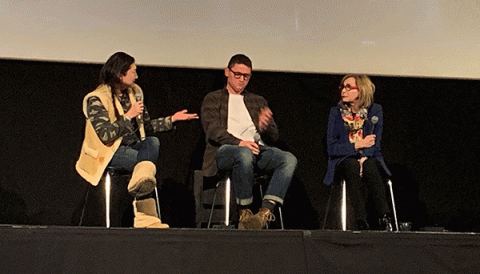
On stage for the Mental Health Film Series at Toronto’s Hot Docs Cinema for a Q&A following the screening of Richard Lowenstein’s documentary Mystify about late INXS frontman Michael Hutchence — who committed suicide in 1997 — Royal Mountain label manager Marc Cremonese said, “Last year, Royal Mountain Records pinpointed an initiative that gives artists on our roster $1500 a year, per artist, to work towards their mental health or other health, whatever they feel is most important — some feel that’s the dentist, but the baseline was it was supposed to go to mental health therapy, et cetera.
“We're hoping to continue doing it this year,” he added. “We are continuing to do this in the future and hopefully grow the amount we give. But it is a non-recoupable amount; they don't have to pay it back. It’s just for their mental health.”
Cremonese explained that Royal Mountain is an artist-founded label, created by members of the now defunct rock band Hollerado led by Menno Versteeg. “So we've always had a very artist-centric focus, which is why we thought it was important to help our artists stay healthy and continue doing what they want to be doing.”
According to Cremonese, label owner Versteeg implemented the gesture after “seeing his friends be depressed, self-medicating, [and] turn to suicide as an escape from those thoughts. That was the thing that propelled him to start this as a community. Touring and being an artist with uncertain money and uncertain job stability can weigh on people as well. And we thought it was the right thing to do.”
Mystify, which reveals Hutchence’s personality change and depression following a brain injury that was kept private at the time, was part of a free docs-and-conversations series about mental health in partnership with Bell Let’s Talk and Workman Arts. The theatre also had a “supportive listener” on hand in case anyone in the audience was triggered by the film’s content.
Bell Let’s Talk Day is Jan. 29, for which the mass media giant will donate 5-cents for every applicable text, call, tweet, social media video view and use of its Facebook frame or Snapchat filter.
Bell has committed $100 million to distribute to mental health organizations and programs since its launch in 2010 (not including monies raised from Let’s Talk Day). The campaign stemmed from CEO George Cope’s personal experience from watching his mother deal with bipolar disorder (Cope retires this month after 12 years at the helm of Bell).
Workman Arts is a multidisciplinary arts organization that promotes a greater understanding of mental health and addiction issues through creation and presentation.
The Q&A was moderated by artist advocate Sally Lee and also included Karen Letofsky, a consultant and educator in the fields of suicide and crisis intervention, whose clients include Bell Media. A member of the Order of Canada, and multi-award winner for her work in suicide prevention, she is currently the associate director for the Canadian Association for Suicide Prevention.
After viewing Mystify, she noted the accumulation of factors leading to Hutchence's downward spiral — “his lifelong journey to find a personal identity; the chaos around him; lack of being in a particular place for any length of time; and then the role of substance abuse” — “and then you look at warning signs that happened much closer to his death,” Letofsky said.
“There are a lot of general things that we say about why someone becomes vulnerable to suicide, but then we also have to look at what are barriers to accessing support. And the initiative by your label is pretty impressive because that reduces one of the barriers,” she said, addressing Cremonese.
“Suicide, there are a lot of general things we can say, but at the end, it's a specific story [Hutchence]. And what struck me was how little we understand the role of acquired brain injury as being a risk factor and the lack of support around recognizing the mental health or the issues that flowed from there.
“What I found hopeful, in spite of the fact that he died, was that he reached out for help. And so with more awareness and education, possibly someone else in that situation might get a different response.”
The National Confrence on Suicide Preventions — the 30th annual — runs this year Oct 28 to 30 in Montreal.
Air Jordan 1 Mid "What The Multi-Color" For Sale